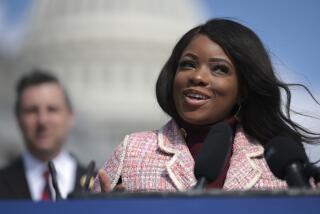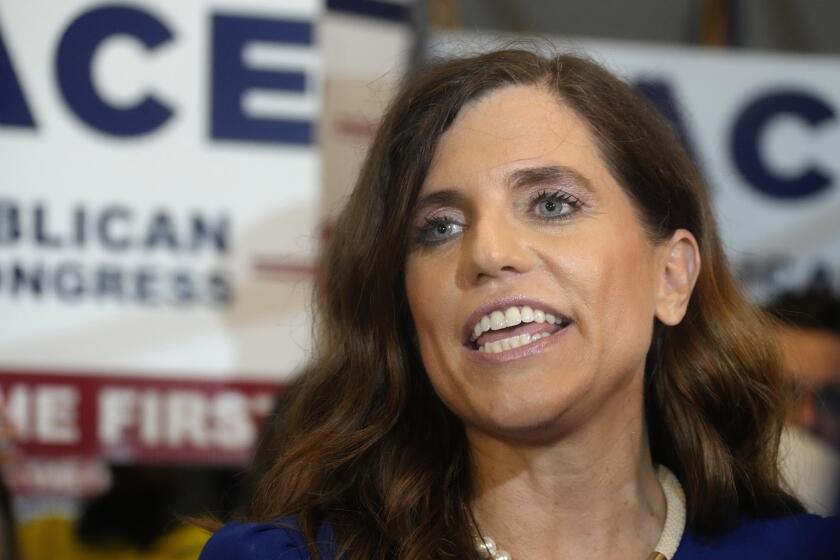4 Democratic Rivals Attack Gore in Debate
Four Democratic presidential candidates, stung by Tennessee Sen. Albert Gore Jr.’s recent efforts to depict himself as the Democrat strongest on defense, ganged up on him Wednesday in the most heated campaign debate so far, and at a free-swinging news conference afterward.
Sen. Paul Simon (D-Ill.) led off the attack, accusing Gore of “knifing” his rivals with suggestions that they advocate “the politics of retreat, complacency and doubt” on issues varying from missile development to U.S. intervention in the Persian Gulf.
Minutes later, Missouri Rep. Richard A. Gephardt charged Gore with creating “phony differences” between himself and the other candidates in debates and speeches over the last two weeks. Gephardt implied the tactic was a bid to pick up support in the crucial Super Tuesday primaries in Gore’s native South next March.
Wednesday’s debate was a dramatic departure from the easygoing nature of the Democratic forums held since July. Gore gave back as good as he got in the brawl played out on a concert stage at the John F. Kennedy Center, first before an audience of 378 party professionals who will be delegates to the 1988 nominating convention, then amid a swarm of reporters and cameras.
“If you can’t stand the heat, get out of the kitchen,” Gore snapped as Simon spoke of the need to “keep in mind a good healthy tone” in the campaign.
Gore, asserting that there are “sharp disagreements” between him and the other candidates, said Democrats had been losing presidential elections “rather consistently” because their candidates failed to advocate a willingness “to defend our vital interests in the world when they are challenged.”
“Retreat, complacency and doubt are labels that I believe characterize a view in part of the Democratic Party that all five of my opponents have come close to subscribing to,” Gore told reporters.
He styled himself a “centrist realist” in favor of “a strong national defense as we pursue arms control.”
Gore maintained that his rivals’ support of proposals to limit U.S. escorts of Kuwaiti tankers in the Persian Gulf was “a policy of retreating from leadership in that area.”
Simon retorted: “There’s not a single candidate here who says we ought to retreat.”
Gephardt added: “Everybody agrees we ought to be there. The issue is how to do it. . . . I believe we ought to have a multilateral force.”
Gore also charged that all of his rivals except former Arizona Gov. Bruce Babbitt support a ban on flight testing of missiles, which he termed “a policy of complacency.”
Gephardt retorted that “Sen. Gore is saying that we’re for a flight test ban on missiles without qualification, without mutuality, without verifiability, without it being in the context of arms control. Nobody has said that; nobody has suggested that.”
Addressing Gore, Gephardt said: “The fact is that you and I and the rest of us agree on more than we disagree on, so let’s not raise differences between Democrats and Dixiecrats. I don’t think we ought to try to bring Strom Thurmond back into the Democratic Party.”
Thurmond, now a Republican senator from South Carolina, bolted the Democratic Party in 1948 to run as the States’ Rights candidate for President.
The Rev. Jesse Jackson, a South Carolina native who is banking as heavily as Gore on the Super Tuesday primaries, joined the assault, suggesting that Gore is jeopardizing unity in a “new Democratic Party” that includes masses of new black voters in the South. Jackson denounced Gore’s “attempts to be a Democrat in Republican clothing.”
Babbitt used more of a needle than a cudgel on Gore as he slid in next to the Tennessean at the session with reporters.
“You’re sounding like a tough kid on the block,” Babbitt said. “You need to kind of lighten up--not use so many big adjectives.” Gore, he added wryly, is “getting intemperate” in his use of “pejorative adjectives.”
The sometimes hostile exchanges were somewhat of an embarrassment to the sponsoring Democratic National Committee and debate moderator Paul G. Kirk Jr., the party chairman. Kirk had boasted of a Democratic Party united to regain the White House from Republicans.
Massachusetts Gov. Michael S. Dukakis stayed free of the fray, although he sparred vigorously with Gephardt over development of the Midgetman missile.
In a spirited exchange, Gephardt criticized Dukakis for opposing the small, mobile single-warhead Midgetman missile, which Gephardt said is favored by “a large consensus of Democrats” as an alternative to the multiwarhead MX.
Dukakis said the country cannot afford the Midgetman’s $50-billion cost in the face of “unprecedented” budget deficits, which he pointedly noted were the creation of not only the executive branch but Gephardt’s congressional colleagues. He said priority should be given to beefing up conventional military forces.
More to Read
Get the L.A. Times Politics newsletter
Deeply reported insights into legislation, politics and policy from Sacramento, Washington and beyond. In your inbox three times per week.
You may occasionally receive promotional content from the Los Angeles Times.






